Its been about one hundred and fifty years since Schliemann discovered the site of Troy. Yet no one has found any evidence that the Greeks ever fought there. The capture of Troy and the wanderings of Odysseus have had an unrivaled hold on the imagination for more than twenty-five hundred years. The chain of tradition is an unbroken one, through antiquity and the Middle Ages down to our own day, when the word ”odyssey” is a common cliche along with ”Achilles’ heel” or ”Trojan horse”. As far back as 500 B.C. or earlier, the Etruscans had a predilection for scenes of the Trojan War on the Greek painted pottery which they imported into central Italy. The Romans then went further and linked themselves directly with the Trojans by fashioning a new foundation legend, incompatible with their older myth of Romulus, from whom the city was supposed to have taken its name.
Their new hero-founder was Aeneas, one of the Trojan survivors , and it was around him that Virgil wrote the great Roman epic the Aenid. The Roman example later spread , and during the Middle Ages it was commonly believed that English history began with Brute, or Brutus the Trojan, and that the Franks were descended from Francus, son of Hector.
The oldest and fullest information about the Trojan War comes from the two poems the Iliad and the Odyssey, some sixteen and twelve thousand lines in length, respectively, and both attributed to Homer. Yet they provide nothing like the whole story. The Iliad is devoted to a few weeks in the tenth year of the war, ending not with the fall of the city but with the death of Hector, the greatest of the Trojan warriors. The Odyssey narrates the wanderings of Odysseus for ten years after the victory, before he could return to his native Ithaca, a small island off the western coast of Greece.
There is a good deal of reminiscing, especially in the latter poem, which helps fill out he account, but there are still many missing pieces. For them we depend on fragmentary material scattered throughout Greek and Roman literature of all kinds, such as the great Athenian tragedies, the works of antiquarians, and mythographers, or the Latin poems of Ovid. When we try putting all the scraps together, they add up to too many, and often to contradictions.
The mythical imagination did not come to an end with the Iliad and the Odyssey but went on creating new variations and combinations as well as reviving old traditions which Homer failed to include. Inconsistencies arose even about the most central figures. Everyone was agreed, for example, that Helen was the daughter of Zeus and Leda, but Homer chose to ignore the most interesting and famous element in the story of her birth. This is how Euripides has Helen herself tell it, at the beginning of his tragedy named after her: ”Nor is mine own country obscure. It is a place called Sparta, and my father was Tyndareus: though they tell a story about how Zeus took on himself the shape of a flying swan, with eagle in pursuit, and came on wings to Leda my mother, and so won the act of love by treachery. It may be so.”
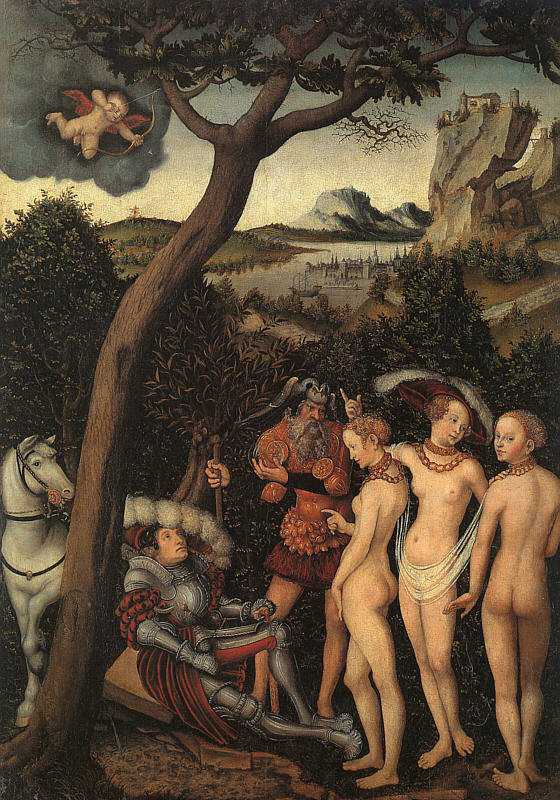
Lucas Cranach.''Zeus then decreed that this quarrel over the golden apple was to be settled by a mortal man named Paris, living the life of a shepherd at that time, unaware that his true parents were the rulers of the mighty city of Troy. So one day, literally out of the blue, Hermes came to Paris out tending his flocks, and gave him the golden apple along with Zeus' instructions to decide which goddess would get it. He had to choose between Hera, Zeus' wife, Athena, the warrior goddess, and Aphrodite, the goddess of love, beauty and sex.''
Helen had twin brothers named Castor and Pollux. In the Iliad they are mortals, in fact they are already dead, whereas the later Greeks generally believed them to be gods; they were worshipped in Sparta, among the Greek settlers in southern Italy, and elsewhere. Not later than 550 B.C. , furthermore, a lyric poet named Stesichorus introduced a radically new twist designed to save Helen’s reputation now that moral values had undergone a change. In this version, Paris got Helen as far as Egypt, and there good king Proteus, the Old Man of the Sea, hid her and replaced her with a ghost, whom the addled young Trojan prince took home with him, deluded into thinking that he had the flesh and blood Helen.
Such examples can be multiplied a hundred-fold. They did not go unnoticed among educated Greeks, and something of a scholarly literature on the subject developed in antiquity.Thus, the great geographer Eratosthenes dismissed as idle the attempts to identify in Sicily and Italy the places where Odysseus had his wondrous experiences; a game which is still being pursued by some scholars. ”Homer” he wrote, ”neither knew them nor wished to set the wanderings in familiar places. ”
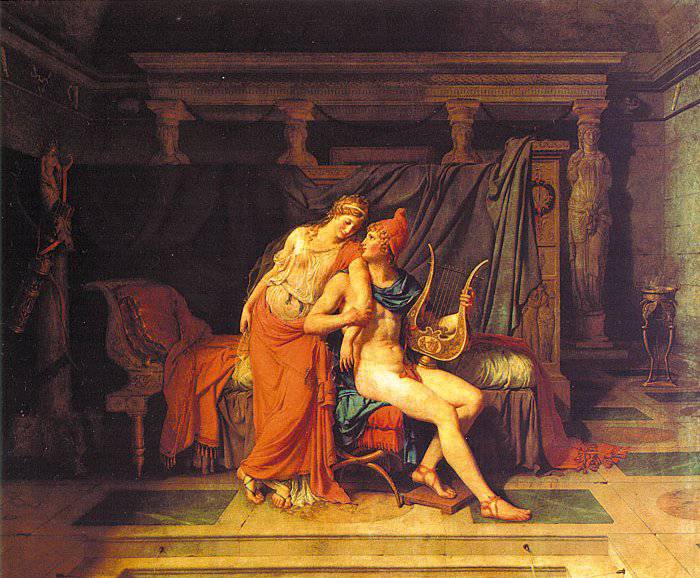
''Paris awarded the golden apple to Aphrodite, largely because of the offer she had made to to influence his decision, that if he chose her, she would compel the most beautiful woman in the world to fall in love with him. True to her promise, Paris was promised the love of Helen of Sparta, at that time the wife of Menelaus. Because of Aphrodite's power, Helen would do whatever Paris wanted, thus when he arrived at Sparta, he soon persuaded her to leave her husband and return with him to Troy, which she did. The scene of Paris
ing Helen is the subject of this painting by Jacques-Loius David, from 1788...''But not one Greek or Roman is on record as having rejected the historical truth of the tale as a whole. Herodotus, the ”father of history” , a far more penetrating and far less gullible inquirer than he is often made out to be, ascribed the beginnings of mutual hostility between Greeks and Asiatics to the Trojan War, when ”the Greeks, for the sake of a single Spartan girl, collected a vast armament, invaded Asia and destroyed the kingdom of Priam”.
In the next generation the still more tough minded Thucydides introduced and justified his history of the war between Athens and Sparta by arguing that it was the greatest war ever, greater even than the Trojan war. The early Church fathers too, had to make allowance for Homer, and an entertaining debate arose between pagans and Christians over the question of priority between Homer and Moses.
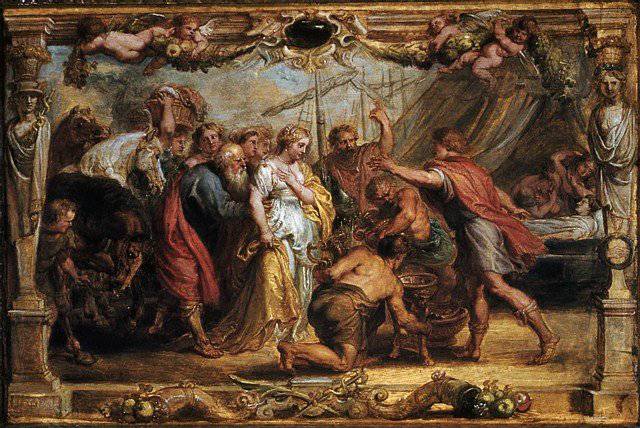
''Agamemnon was glad to have Achilles back and showered him with rewards, including the return of Briseis, the girl who had been taken from him after their initial argument. Rubens depicted this scene, as well as the final battle of Achilles and Hector. But after killing him, Achilles was still enraged, and abused the body of Hector by dragging it behind his chariot around the walls of Troy.''
In brief outline, the tale they all believed was this. Paris, otherwise called Alexander, one of the sons of King Priam of Troy, or Ilion, visited Sparta and fell in love with Helen , wife of King Menelaus. His love was returned thanks to Aphrodite, whom the Romans called Venus, and the pair fled Sparta for Troy, where they lived more or less happily as man and wife. Menelaus turned for help to his more powerful brother Agamemnon, king of Mycenae.
They summoned other Greek princes and chieftains to join in an invasion of Troy, and together they mustered an armada of 1,186 ships in which they set sail from Aulis on the Euripos Strait, between Euboea and the Greek mainland. In the tenth year of the war the Greeks defeated the Trojans and their Asiatic allies; Troy was captured and raised, honor was restored, and some of the returning heroes then entered upon a new series of adventures. While Menelaus and Helen settled down to a peaceful old age in Sparta, Agamemnon was promptly killed by his wife Clytaemnestra, Helen’s sister, and her paramour. It was another ten years before the god Poisedon finally allowed Odysseus to see his home again.
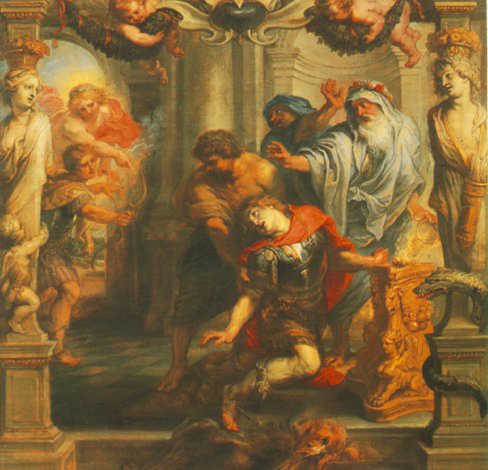
''Achilles himself did not live to see the end of the war, for shortly before that, he was ambushed and shot with a poisoned arrow by Paris, as seen here in the painting by Rubens.''
Stripped of the magic of its poetry and its leisurely pace of richness of detail, the Homeric tale sounds flat and not very credible. It is precisely the Homeric genius which captured the imagination and which therefore is basically responsible for the way poetry became converted into history. Nor was it only the ancients who accepted the account as true in its essentials, depite the gods and the inconsistencies; so did nearly everyone else down to the nineteenth century.
The rise of modern historical criticism at that time led to serious doubts, and then to outright rejection, of the historicity of the Trojan War. The English liberal and banker George Grote, whose twelve volume ”History of Greece”, published between 1846 and 1856, was the first major modern work on the subject, had no hesitation in calling the whole Trojan story an ”interesting fable” . Despite its great appeal, he wrote ” it is a mistake to single it out from the rest as if it rested upon a different and more trustworthy basis”.

Frederick Leighton. ''Another popular subject is Helen by herself: these paintings, all from the late 1800s, are portraits of her, the artists' effort to capture the ultimate beauty of the ideal woman, but along with her comes the cost of the death and destruction of Troy.''
Leda and the Swan is a watercolor by Gustave Moreau, done about 1880, which is noted for one special reason, for it was the inspiration for this poem written in 1928 by William Butler Yeats, one of the most noted poets of the time. The poem, just as the painting, is primarily an erotic description of their lovemaking, yet lurking in the future because of this act of love is the death and destruction of the war.
”A sudden blow: the great wings beating still
Above the staggering girl, her thighs caressed
By the dark webs, her nape caught in his bill,
He holds her helpless breast upon his breast.
How can those terrified vague fingers push
The feathered glory from her loosening thighs?
And how can body, laid in that white rush,
But feel the strange heart beating where it lies?
A shudder in the loins engenders there
The broken wall, the burning roof and tower
And Agamemnon dead.
Being so caught up,
So mastered by the brute blood of the air,
Did she put on his knowledge with his power
Before the indifferent beak could let her drop?”


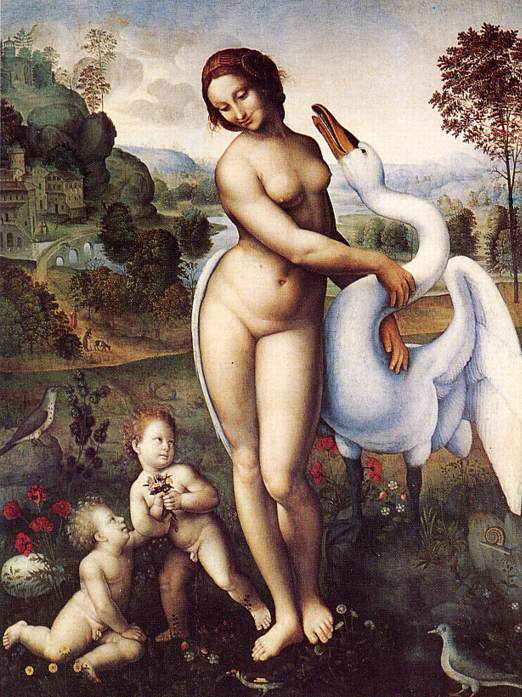
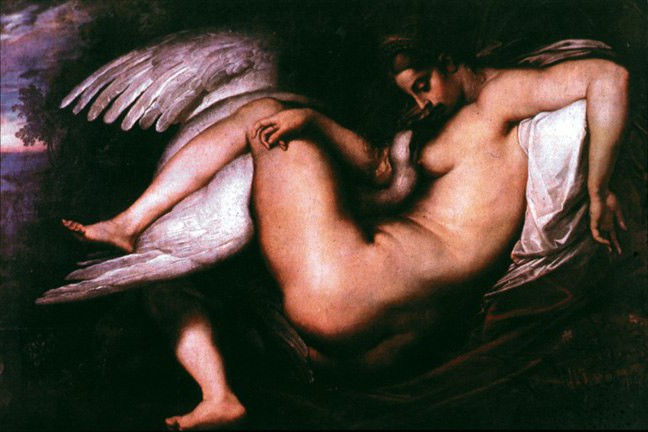
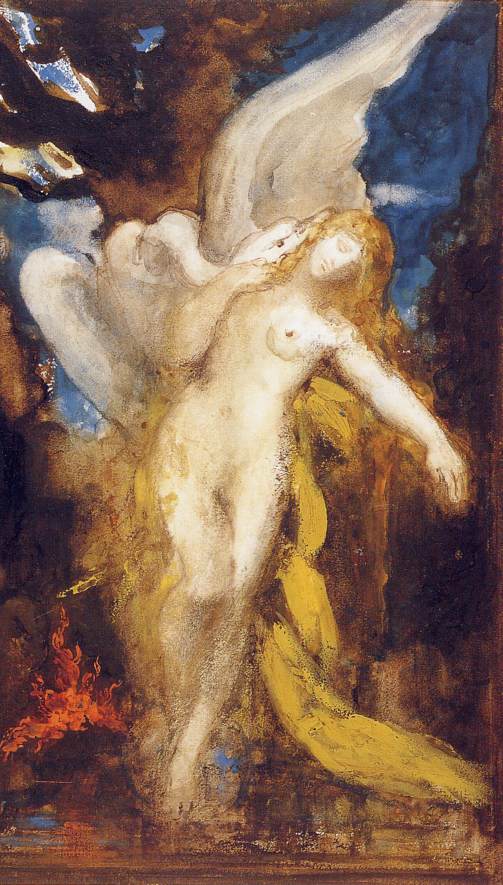



 COMMENTS
COMMENTS